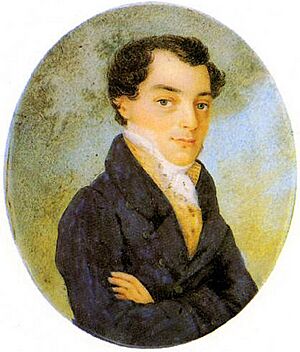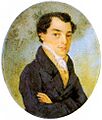Kondraty Ryleyev facts for kids
Kondraty Fyodorovich Ryleyev (born September 29, 1795 – died July 25, 1826) was a Russian poet and publisher. He was also a key leader of the Decembrist Revolt. This revolt was a brave attempt in 1825 to change the way Russia was ruled.
Contents
Early Life and Education
Kondraty Ryleyev was born in a village called Batovo. His father, Fyodor Ryleyev, was a nobleman who didn't have much money. He worked as a manager for a wealthy prince.
Even though his family wasn't rich, Kondraty got to study at the Page Corps. This was a special military school in Saint Petersburg for noble families. After graduating, he joined the army. He fought in wars in Poland, Germany, and France between 1814 and 1815. These were during the time of the Napoleonic Wars.
In 1818, Ryleyev left the army. For a while, he taught children for a rich landowner. A year later, he married the landowner's daughter, Natalya Tevyasheva. They had two children together.
Ryleyev's Career and Writings
Ryleyev became known in writing circles around 1820. He wrote a poem called To the Favorite, which made fun of an unpopular government official. In the same year, he joined a group called a Masonic lodge. Here, he met many people who would later join the Decembrist uprising.
To earn money, Ryleyev worked in a court in Saint Petersburg from 1821 to 1824. He often used his job to help ordinary people who were in trouble. One person he helped was Alexander Nikitenko. Nikitenko was a serf, which meant he was like a servant tied to the land. Ryleyev helped him gain his freedom. This case became very famous in Saint Petersburg.
Ryleyev also kept writing. In 1821, he joined a group of Russian writers and thinkers. He also helped publish a popular yearly magazine called The Polar Star. Many famous Russian writers, like Alexander Pushkin, wrote for this magazine. Ryleyev wrote poems too, such as Civic Courage and The Citizen. His writing was inspired by other Russian poets and by the British poet Lord Byron. Ryleyev's poems were full of strong feelings and were very popular when they came out.
His writing alone wasn't enough to support his family. After leaving the court, he worked for the Russian-American Company in Saint Petersburg.
Ryleyev the Revolutionary Leader
In 1823, Ryleyev joined a secret group called the Northern Society. This group was made up of people who wanted big changes in Russia. Many of them were soldiers who had fought in the Napoleonic Wars. They wanted to end serfdom, where people were tied to the land. They also wanted to change the Tsar's government to one where people had more say.
Ryleyev believed their plan might fail and that they could be executed. But he felt their actions would still be important. He thought their sacrifice would "awaken Russia" and teach future generations. He once said that if they failed, their failure would be a lesson for those who came after them.
Another leader, Pavel Pestel, explained that they wanted to free the serfs. They tried to convince the nobles, but it was very hard.
Ryleyev wrote a poem called Nalivaiko's Confession. In it, he hinted that he was ready to die for the cause of freedom. He wrote about wanting to see his homeland free, even if it meant taking on all sins. He believed that freedom often required people to make great sacrifices.
In 1824, Ryleyev became a director of the Northern Society. He was a great speaker and good at getting others to join. A friend said that when Ryleyev spoke about loving his country, his eyes would shine, and his words would flow like a river of fire.
Ryleyev wanted Russia to have a government like the United States. He was even willing to support removing the Imperial Family if they didn't agree to changes peacefully.
Ryleyev's Connection to Ukraine
In the early 1800s, Ryleyev started writing a poetic story called 'Nalyvaiko'. This story was about a Cossack leader from Ukraine in the late 1500s. His writings inspired many revolutionaries later on.
Ryleyev spent almost three years stationed in Ukraine with his army unit. There, he met his future wife, Natalia Teviashova. She was the daughter of a Cossack officer from a noble family.
Even after moving to Saint Petersburg, Ryleyev often visited Ukraine. He loved the land and its people. He wrote to a friend, saying he was Russian but had fallen in love with Ukraine and its people. He was also grateful because his wife, who made him happy, was Ukrainian.
Ryleyev was very inspired by the Cossacks he met. He saw them as "champions of liberty" because of their brave history. He even helped free people from serfdom. One person he helped mentioned that his grandfather used to talk about the old Cossack times and criticize the local government. This suggests that people could be punished for remembering the past.
In 1823, Ryleyev wrote a poem about Tsar Peter I and Hetman Ivan Mazepa. Mazepa was a Ukrainian Cossack leader who fought against Peter I. Ryleyev wasn't afraid to write about difficult historical topics. He even started another poetic story about Mazepa's nephew, Andrii Voinarovsky. This story showed Mazepa in a good light, as a patriot willing to die for his homeland. The story was published later, but only after some parts were removed by government censors.
Ryleyev also published a collection of poems called 'Dumy'. He said that these poems were inspired by an ancient Ukrainian tradition. He noted that Ukrainians still sang 'dumy' about their heroes.
The Decembrist Revolt
On December 26, 1825, a group of officers and about 3,000 soldiers gathered in Saint Petersburg's Senate Square. They refused to promise loyalty to the new Tsar, Nicholas I. Instead, they supported his brother, Grand Duke Constantine, and called for a new constitution. They shouted, "Constantine and Constitution!"
They hoped more soldiers would join them, but this didn't happen. The revolt faced problems when its chosen leader, Prince Sergei Petrovich Trubetskoy, didn't show up. Ryleyev knew the situation was serious. He said, "Our last moments are near, but they are the moments of our liberty."
For many hours, the 3,000 rebels faced 9,000 soldiers loyal to the Tsar. There was some shooting. A large crowd of people watched, but the rebel leaders didn't ask them to join. The new Tsar, Nicholas I, came to the square himself. He sent a hero of the Napoleonic Wars, Count Mikhail Andreyevich Miloradovich, to talk to the rebels. While Miloradovich was speaking, one of the rebels shot him dead.
After trying to talk to the rebels for most of the day, the Tsar ordered his cavalry to charge. But the horses slipped on the icy ground. Finally, as evening came, the Tsar ordered three artillery groups to fire cannons. This had a terrible effect. The rebels scattered and ran. Some tried to gather on the frozen Neva River, but they were hit by cannon fire there too. The ice broke, and many soldiers fell into the river. By nightfall, the revolt was crushed.
Arrest and Execution
On December 27, 1825, Ryleyev was arrested for his part in the uprising. He was accused of treason. Along with four other leaders, Ryleyev was sentenced to be executed.
During his questioning, Ryleyev did not name anyone else involved in the rebellion. He even asked the investigators to execute only him for the revolt. He said he prayed that only he would be punished, and that others would be allowed to return to their families.
Ryleyev was executed on July 25, 1826. He died holding a book of poems by Lord Byron.
Images for kids
 | Percy Lavon Julian |
 | Katherine Johnson |
 | George Washington Carver |
 | Annie Easley |



